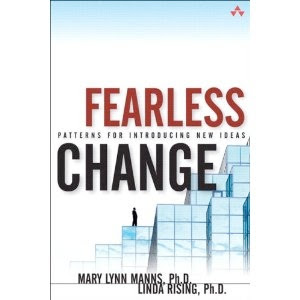
First, a word about happiness. I am sure I don't know everything about happiness, but I am still quite sure it is important. Mr. Jefferson included, in his draft, "life, liberty and the pursuit of happiness". And Jeff Sutherland says "if they aren't having fun [with Scrum], they aren't doing it right."
Serious fun, fun that comes mainly from work. But still fun.
Umm. I think there may still be some of us who feel that things are good only when we are in pain. I guess if that is fun for you, go for it, as long as you don't hurt anyone else. Anyway, do not put me in the camp of ascetics or stoics. Pleasure, if done right, can lead to creativity.
But the main subject is freedom! Freedom! What a great word. The second greatest word in the English language.
This is the day on which we celebrate the Declaration of Independence. A declaration for freedom. "We hold these truths to be self-evident. That all men a created equal. That they are endowed by their creator with certain unalienable rights. That among these are life, liberty, and the pursuit of happiness." What glorious ringing words.
And still we are not free. In ways big and small, others try to enslave us. In ways big and small, we enslave ourselves. As Rousseau said: "Man is born free and everywhere is in chains."
Managers: Never, never, never, never enslave your associates. They do not belong to you. You did not create them. Even if they ask you to, do not abrogate their freedom. God gave them freedom for many mystical reasons, the source and meaning of which you haven't the least idea. You are a manager to help them fulfill their lives, not to take their freedom away.
Let me be yet more honest. You have been taught, and it is in the bones of most of you, to enslave your associates. I, as one, do not blame you; you have been taught badly and you are human (imperfect). I too have committed these sins. But do not be complacent with your imperfections. Try hard to stop doing it.
Workers: Never, even for a second, give up your freedom. You freedom of action, of speech, of association. Your freedom to be yourself. You never said "I agree to be a slave to this firm or this manager." Don't do it. In fact, most managers can feel in their bones the sin of abrogating your freedom; do not let them sin more.
Yes, you do not have to tell me all the temptations you face to give away your freedom. On some days, it seems a good trade, and it seems that we might pawn it and get it back later. It is hard. But having fun is hard too. You, your freedom are worth the pain of this hard passage.
[Yes, of course, there are certain social constructs that limit our freedom. We don't yell "fire" in a crowded room, etc, etc. It is a complicated subject. So, study it!]
So, how does Scrum instantiate freedom. Well, one way is that each person reports for himself or herself in the Daily stand-up. One way is that the Team gets to choose how many Product Backlog Items to commit to in the Sprint Planning Meeting.
More broadly, in Scrum we accept (well, more) that a person brings everything he or she is to a Team. And thus has much more to offer a team (yes, and, well, maybe a bit more to deal with too). We are free(er) to be who we really are.
Immediately after mentioning freedom, we must also mention responsibility. If you are free, you are also responsible for yourself. This is a great lesson of life. Mysterious, just as God gives us responsibility for ourselves, he also makes the sun to shine and the rain to fall on both the wicked and the good. Consider the lilies of the field, we might say. In a free economy, much is magically provided for us. Still, we must work, we must learn that it is more blessed to give than to receive. We must learn that we must still get along, in business, with even quite disagreeable people (the simple version of "love your enemies").
How does this work in Scrum? So, in Scrum, the team at the end of the Sprint Planning Meeting commits to 8 or 12 or 15 Product Backlog Items. They become responsible for delivering those by the end of the Sprint. They are free to do it anyway they want, but they have committed to deliver. They are responsible.
"That whenever any form of government becomes destructive of these ends, it is the right of the People to alter or abolish it..." Yes, and this is the slow, painful path we are on in abolishing Waterfall and all its associated bad thinking. We have this right. We have this duty even. We must fix it. May it be that the lean-agile-scrum with which we wish to replace waterfall are worthy successors and worthily practiced by the players.

So, on this beautiful day (and are not they all beautiful) send not to know for whom the bells toll. The bells of freedom toll for you. The fireworks of freedom are lit for you. Whether you are in Demorest, GA, or Ottawa, or Bangalore, or Paris, or Amsterdam, or South Africa, or Lima. No man is an island, because each of us is involved in mankind.







